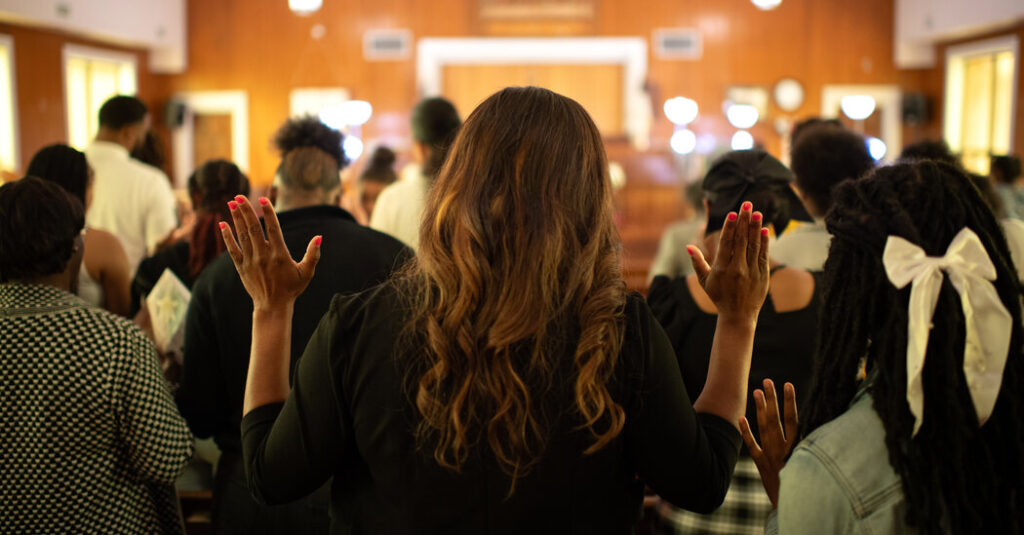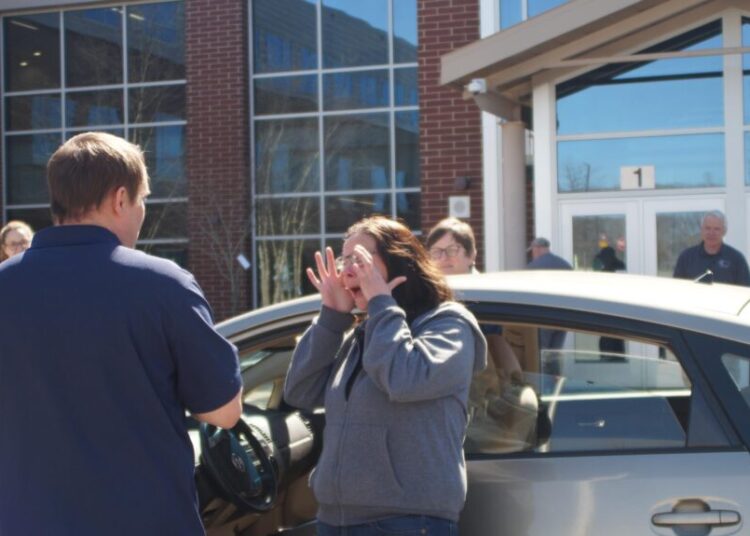At Charlie Kirk’s memorial service in Arizona in September, the Times religion reporter Elizabeth Dias listened as speakers described him as a Christian martyr. Then President Trump took the microphone. He cast Kirk as a political martyr, “for American freedom,” and contrasted his own “hate” for his opponents with Kirk’s wanting the best for them.
We heard from some readers who wanted Ms. Dias to take sides in her coverage: Critics of Mr. Trump wanted Ms. Dias to label him as “un-Christian” (in the words of some), and supporters of Mr. Trump wanted her to lionize Kirk as a model of their faith. That desire for The Times to referee debates within Christianity comes up regularly, including from some readers pushing us to describe certain viewpoints as “Christian nationalism” — something Ms. Dias and our colleague Ruth Graham, who also reports on faith and values, haven’t done in their own words.
I recently asked Ms. Dias and Ms. Graham to discuss how The Times covers Christianity and to reflect on some of the reader questions and skepticism they encounter.
We’re in an era when religious belief and moral values are being contested by many Americans. “I know Christianity when I see it, and this isn’t Christianity” is something we hear regularly from some readers in reference to Christians who support President Trump. And we hear from conservative readers who feel The Times is biased against Christians. How do you navigate this in your reporting?
ELIZABETH DIAS: So many people experience the world of Christianity differently. Inside the stadium at the Kirk memorial, I heard conservative Christians sharing testimonies of how they believed God used Charlie to help save America and spread the Christian gospel. At the same time, I was getting text messages from progressive Christians about how afraid they were as they watched from the outside. Part of our jobs as reporters is to help readers see the full picture, not just a half picture.
RUTH GRAHAM: I think a lot about giving people a cleareyed sense of the way Christianity is a powerful political tool, and the specific ways that tool kit is changing. I also want to help them better understand the ideas and impulses that animate sincere religious belief. Millions of people shape their lives around religious belief for a reason.
How do you do that?
GRAHAM: I think a lot about which details to include in a story, and how I’m describing people and scenes. Part of fairness is not taking cheap shots by subtly depicting one side as backward or unsophisticated, for example. I also try to bring people into as many houses of worship as possible. And I would define that expansively, from traditional church services to prayer meetings to worship services in the Trump White House.
DIAS: I studied the history of Christianity when I was in graduate school — seminary, actually — and Christianity and politics have always been intermingled. When people tell me about their faith story, I’m mindful that many see themselves in a story line that spans hundreds and thousands of years, not just this particular modern moment. I remember talking to one Christian man in politics earlier this year who was explaining to me that while, yes, he sees America as a democracy, he also ultimately sees it as a democracy inside a monarchy where Jesus is king.
That’s going to sound pretty un-American to some readers. But many people experience Christianity differently.
GRAHAM: A lot of evangelical pastors have become much more willing to address political and cultural topics from the pulpit, or at least in their capacity as spiritual leaders. There’s maybe a conception they have always done that, but a lot of mainstream evangelical pastors avoided it in the decades before the Trump era. That is changing, in part because of people like Kirk, who encouraged conservative pastors to speak politically by framing it as simply speaking Biblically.
What are some of the thorny editorial issues and judgment calls that you’ve had to wrestle with?
DIAS: I recently did a story with our colleague Jane Bradley about how a Christian legal group that helped end Roe v. Wade is advancing the anti-abortion cause in the United Kingdom. At one point, a colleague suggested we use the phrase “Christian nationalism” in a headline. But that’s not a phrase we used in the story, and it’s actually not a phrase Ruth and I have used so far in our voice elsewhere, for a variety of reasons.
I want to push on this — some Americans believe the phrase “Christian nationalism” is a factual one to describe the worldview of others, and some of our news articles have featured experts using the phrase about other people.
GRAHAM: We’ve thought really carefully about “Christian nationalism.” It’s a term that was originally used by academics and by activists who were critical of the movement they described that way. And very few people used the term to describe their own beliefs. That’s actually changing now, but it’s still essentially people reclaiming what they understand to be a slur. I also think if you asked 10 people what it means, you would get 10 definitions. So for now, I find it more helpful for readers to tell them what a person says and does, rather than to impose a label that would actually be less informative.
Ruth, are there other examples of labels or language that you’ve grappled with?
GRAHAM: Literally just as we were having this conversation, I got an email from a reader upset that I had used the term “Mormon” in a headline about the new president of the Church of Jesus Christ of Latter-day Saints. The church changed its approach to that language pretty abruptly a few years ago, so now we make an effort to use that term minimally, often only in headlines. Many church members still use it colloquially. But others have essentially stopped and find it offensive in a lot of settings. I wrestle with wanting to be respectful, and use the terms people prefer for themselves, while also needing to be clear to readers who have not kept up on these changes.
President Trump hangs over your beat in a way that frustrates some people. One Times reader recently wrote of Trump: “Kind of wondering when the ‘Christians’ will recognize who he is. Everything he says and does is ‘anti-Christian.’ When he has a golden calf forged, will they celebrate that, too?” I know you both get asked questions like that. How do you answer them?
GRAHAM: Mercifully it is not my job to decide who is a “real Christian,” which often feels like the subtext of those questions. It’s just not my role as a reporter to adjudicate that. What I can report is how a person describes themselves, what they say they believe, and what they do and say.
DIAS: I’ve come to describe Christianity as plural, not singular. There are many different expressions of Christianity, so many different theological beliefs. Many believers see their version as the pure or ultimate Christianity. Families and churches have experienced excruciating splits over Trump and his policies, like vaccines or immigration. In this question I also hear worries about what moral vision wins out, what that means for people you love, and a kind of personal trauma that happens when one’s own moral code feels denied.
Religion is so personal in the way you describe, Elizabeth, that I wondered if you’ve had any uncomfortable or difficult experiences staying impartial on your beat.
DIAS: So a few days after Pope Leo XIV was elected, he met with press and communication workers in the giant Paul VI hall inside the Vatican to greet everyone for really the first time. There were thousands of us there — everyone from mainstream independent outlets like The Times to Catholic publications and even diocesan communication staff. I was sitting in a row with our Times colleagues — we’d all been writing about the conclave together. When Pope Leo walked in, the place erupted in applause and cheers, people yelling, “¡Viva el Papa!” and shouting in joy. For me, that would be like cheering for a president.
Yeah — we’re there to report, ask questions, engage with the moment as independent journalists.
DIAS: Right. Many people around us were participating in a sort of spiritual way. Instead we stood together in our little line, but did not cheer or applaud. It may have felt a little bit awkward, standing out like that, but it also felt like an appropriate and respectful balance.
What standards do you use in judging what language is fair in stories? Some words and phrases are insulting and off-putting to people or faith.
GRAHAM: Terms like “Mormon” but also words like “traditional” or even seemingly straightforward phrases like “bread and wine” can be hotly disputed or even offensive depending on the context. Foreseeing those third rails is important.
That said, we need to use language all readers will understand. We need to use shorthand to a degree — we are not going to print the full Nicene Creed to describe someone’s beliefs.
DIAS: And this also means “translating” religious terms for people who aren’t familiar with faith, without sounding out of touch to religious readers. Like, the 23 percent of America that is evangelical knows instantly what I mean by “worship team,” or “elder board,” or “slain in the spirit.” But secular readers might not.
How do you come up with stories? What are your standards for what merits a story on the religion beat?
DIAS: Some things are obvious news stories — like when Pope Francis died, or Christian voting patterns, or when the Supreme Court overturned Roe v. Wade. Others often emerge from questions. The year Roe was overturned, I did a story that we actually titled with the question driving the reporting: “When does life begin?” It felt like such a central question that was driving the political discourse, but a question that felt too complicated for many people to face. So we explored it as a question, versus announcing an answer.
GRAHAM: It doesn’t have to be an obvious huge news-with-a-capital-N story to be worth reporting. A few years ago, parts of the Catholic world were riveted by accounts of a somewhat macabre miracle in rural Missouri. It was a “small” story but ended up touching on big themes. That’s always the question I’m thinking about: Does this story have something larger to say about faith in America?
It’s also important for me to cover things like spontaneous revivals and the National Bible Bee, to name a few favorite assignments. And I should add that often those stories do reveal political and cultural currents that would never be captured by a more straightforward political story. Politics is an urgent story line all the time, but it’s also not how the vast majority of religious people talk about their own experience of faith.
DIAS: I loved that National Bible Bee story, Ruth!
GRAHAM: I remain in awe of those kids rattling off hundreds of Bible verses by memory. Makes this job look easy.
Elizabeth Dias is The Times’s national religion correspondent, covering faith, politics and values.
The post How Two Times Reporters Cover Christianity in a Polarized America appeared first on New York Times.




